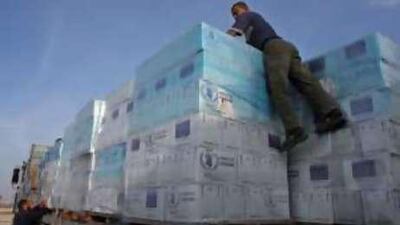RAMALLAH, WEST BANK// Israel rebuffed a plea by the UN to open crossings into Gaza for humanitarian supplies yesterday and continued barring international media from reaching the impoverished strip of land. Asked yesterday whether Israel intended to reopen crossings, Ehud Barak, the defence minister, told Israel Army Radio: "No. There needs to be calm in order for the crossings to be opened."
Ban Ki-moon, the UN secretary general, telephoned Ehud Olmert, the Israeli prime minister on Tuesday, urging him to facilitate the movement of urgently needed humanitarian supplies into Gaza, where relief agencies have had to halt food distribution and the only power station is running out of fuel. Israel closed the crossings two weeks ago when Palestinians responded with a salvo of rockets to a Nov 4 Israeli army raid into Gaza that resulted in the killings of six Gazans.
The tit-for-tat violence has continued since, with Israeli air raids causing at least a dozen Palestinian fatalities and one Israeli wounded by a Palestinian mortar. Hamas is understood to be trying to persuade some of the smaller Palestinian factions, including the Popular Resistance Committees and the Palestinian Front for the Liberation of Palestine who have claimed responsibility for firing rockets in the past two weeks, to desist.
Nevertheless, Hamas's military wing yesterday also warned that it was prepared to end a five-month-old ceasefire should crossings remain closed. It would appear to be in neither Israel's nor Hamas's interests to end the ceasefire, however. Israeli politicians are facing general elections in early February and although taking a tough posture with Palestinians is an oft-tried campaign strategy, barring a full-scale - and unpredictable - invasion of the Strip, Israel would seem unable to ensure calm around Gaza without the ceasefire in place.
Hamas, for its part, will be eager for the ceasefire, which officially runs out on Dec 19, to be extended to continue to consolidate its rule over Gaza and strengthen its hand in internal Palestinian negotiations over reconciliation. Nevertheless, Hamas cannot afford to be seen to have abandoned the option of armed struggle and will probably enter the fray should crossings into Gaza remain shut. Several international relief agencies have warned of a full-scale humanitarian disaster should food and medicine continue being blocked from entering the strip. On Sunday, the United Nations Relief and Works Agency announced that it had to stop distributing food to the about 750,000 Palestinians who rely on it for their immediate needs.
On Monday, Israel allowed a limited shipment of food and medicine to reach the strip, but the army shut the border again after three rockets were fired across the border on Tuesday, and yesterday it was reported that Gaza's biggest mill had closed because of a lack of wheat. Gazans are also suffering regular electricity blackouts as a result of the scarcity of fuel. Foreign journalists, meanwhile, are protesting against a ban on international media entering the Gaza Strip, also in effect since Nov 4.
The Foreign Press Association, which represents journalists working for international media in the region, has slammed the decision by the Israeli government as a "serious violation" of press freedom. In an open letter published on Tuesday, the FPA said the decision to bar journalists from Gaza was an "unprecedented restriction of press freedom" and said its protests to the Israeli government had gone unheeded.
"Never before have journalists been prevented from doing their work in this way. We believe it is vital that journalists be allowed to find out for themselves what is going on in Gaza. Israel controls access to Gaza. Israel must allow professional journalists access to this important story." In spite of repeated requests, the Israeli ministry of defence was not available for comment. Israeli officials had said no official decision has been made to stop journalists from reaching Gaza, but that preventing them from doing so in the past two weeks was consistent with army policy only to allow passage for essential humanitarian staff.
In Gaza, officials and human rights activists said Israel was trying to prevent foreign journalists from revealing the reality there. "Israel doesn't want journalists to report on the conditions in Gaza that have resulted from the Israeli siege," said Eyad Sarraj, a psychiatrist with the Gaza Community Mental Health Project and a human-rights activist. "Israel doesn't want journalists from all over the world to bear evidence to what they are doing here."
Mr Sarraj also suggested that Israel was preparing a major military operation, a suspicion echoed by Ahmad Yousef, a senior Hamas official. "Israel might be planning something. For this, they don't want any journalists here to cover their brutality against Palestinians... Journalists are those that can open the eyes of the world by showing them what is really going on in Gaza." okarmi@thenational.ae

